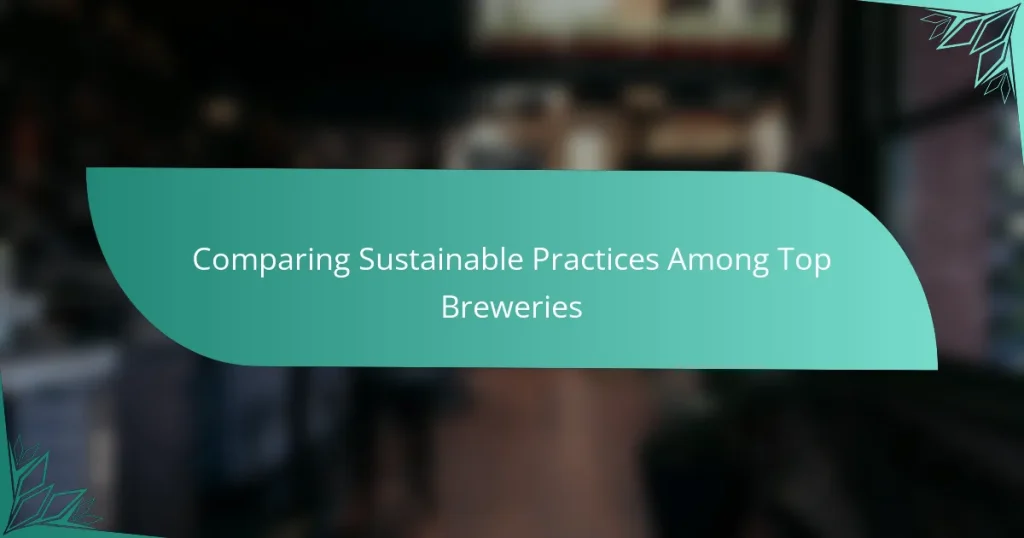Sustainability in brewing is becoming increasingly important as local breweries strive to reduce their environmental impact while fostering community connections. By implementing practices such as renewable energy use, water conservation, and local sourcing of ingredients, these breweries not only enhance their operational efficiency but also appeal to environmentally conscious consumers. However, the transition to sustainable methods can be challenging due to factors like high initial costs and regulatory compliance issues.
Consumer Preferences: Are You Willing to Pay More for Sustainable Beer?
Innovative Waste Management Practices in Craft Breweries
The Future of Eco-Friendly Brewing Techniques
How Sustainability Impacts Craft Beer Pricing
How Craft Breweries Are Reducing Their Carbon Footprint
The Importance of Local Sourcing for Sustainable Brewing
How are local breweries implementing sustainable practices?
Local breweries are adopting various sustainable practices to minimize their environmental impact while enhancing their community presence. These practices include using renewable energy, conserving water, managing waste effectively, sourcing ingredients locally, and engaging with the community.
Use of renewable energy sources
Many local breweries are transitioning to renewable energy sources such as solar and wind power. This shift not only reduces greenhouse gas emissions but can also lower energy costs in the long run. For example, installing solar panels can provide a significant portion of a brewery’s energy needs, especially in sunny regions.
Breweries can also participate in community solar programs, allowing them to invest in renewable energy without the upfront costs of installation. This approach supports local energy initiatives while promoting sustainability.
Water conservation techniques
Water conservation is critical in brewing, as the process requires substantial water use. Breweries are implementing techniques such as rainwater harvesting and water recycling systems to reduce their overall consumption. These methods can cut water usage by up to 50% in some cases.
Additionally, breweries are optimizing their cleaning processes to minimize water waste. For instance, using high-pressure cleaning systems can be more efficient than traditional methods, ensuring that less water is used during sanitation.
Recycling and waste management
Effective recycling and waste management are essential for sustainable brewing. Many breweries are adopting a zero-waste philosophy, aiming to divert as much waste as possible from landfills. This can include composting spent grains and using by-products in animal feed.
Implementing a comprehensive recycling program can also help breweries manage their waste more effectively. This includes separating recyclable materials like glass, cardboard, and plastics to ensure they are processed correctly.
Local sourcing of ingredients
Local sourcing of ingredients not only supports regional farmers but also reduces the carbon footprint associated with transportation. Many breweries are forming partnerships with local farms to obtain hops, grains, and other ingredients, which can enhance the flavor profile of their beers.
By sourcing locally, breweries can also promote seasonal offerings that reflect the local terroir, creating unique products that resonate with their community. This practice fosters a sense of connection between the brewery and its customers.
Community engagement initiatives
Community engagement is a vital aspect of sustainability for local breweries. Many are hosting events, workshops, and educational programs to raise awareness about environmental issues and sustainable practices. This not only strengthens community ties but also encourages responsible consumption.
Breweries can also collaborate with local organizations on sustainability projects, such as clean-up events or tree planting initiatives. These efforts demonstrate a commitment to the community and the environment, fostering goodwill and loyalty among customers.
What are the benefits of sustainability in brewing?
Sustainability in brewing offers numerous advantages, including reduced environmental impact, cost savings, and improved brand perception. By adopting eco-friendly practices, breweries can enhance their operational efficiency while appealing to a growing base of environmentally conscious consumers.
Reduced environmental impact
Implementing sustainable practices in brewing significantly lowers the environmental footprint of operations. This includes reducing water usage, minimizing waste, and utilizing renewable energy sources. For example, breweries can recycle water in their processes, leading to a reduction in overall consumption by up to 50%.
Additionally, sourcing ingredients locally can decrease transportation emissions and support local economies. Many breweries are adopting organic farming practices, which not only benefit the environment but also improve the quality of the ingredients used.
Cost savings in operations
Sustainable brewing practices can lead to substantial cost savings over time. By optimizing energy use and reducing waste, breweries can lower utility bills and disposal costs. For instance, investing in energy-efficient equipment may have upfront costs but can result in savings of 20-30% on energy bills annually.
Moreover, implementing a circular economy approach, such as reusing by-products for animal feed or composting, can further decrease operational expenses. This not only reduces waste but also creates additional revenue streams.
Enhanced brand reputation
Breweries that prioritize sustainability often enjoy a stronger brand reputation. Consumers are increasingly drawn to businesses that demonstrate a commitment to environmental stewardship. By promoting sustainable practices, breweries can differentiate themselves in a competitive market.
Engaging in community initiatives, such as local clean-up events or partnerships with environmental organizations, can further enhance a brewery’s image. Transparency about sustainability efforts can also build trust with consumers, making them more likely to support the brand.
Increased customer loyalty
Customers are more likely to remain loyal to brands that align with their values, including sustainability. Breweries that actively promote their eco-friendly initiatives often see higher retention rates. Offering sustainable products, such as organic beers or those packaged in recyclable materials, can attract and retain environmentally conscious consumers.
Creating loyalty programs that reward sustainable purchasing behaviors can also strengthen customer relationships. For example, offering discounts for returning bottles or participating in recycling programs can encourage repeat business while reinforcing the brewery’s commitment to sustainability.
What are the challenges faced by breweries in adopting sustainable practices?
Breweries encounter several significant challenges when transitioning to sustainable practices, including high initial investment costs, lack of consumer awareness, and regulatory compliance issues. Each of these factors can hinder the adoption of eco-friendly methods and technologies in the brewing industry.
High initial investment costs
One of the primary barriers to sustainability in brewing is the high initial investment required for new technologies and equipment. Upgrading to energy-efficient systems or implementing waste reduction processes can demand substantial capital, often in the tens of thousands of dollars. Smaller breweries may struggle to secure financing for these upgrades, which can delay their sustainability efforts.
Additionally, the return on investment (ROI) for sustainable practices can take time to materialize, making it challenging for breweries to justify the upfront costs. It’s essential for brewery owners to conduct thorough cost-benefit analyses to understand the long-term savings associated with sustainability initiatives.
Lack of consumer awareness
Many consumers are not fully aware of the environmental impact of their beverage choices, which can limit demand for sustainably brewed products. Without a strong consumer push for eco-friendly options, breweries may hesitate to invest in sustainable practices. Educating customers about the benefits of sustainability can help drive demand and encourage breweries to adopt greener methods.
Breweries can engage in marketing campaigns that highlight their sustainable practices, such as using local ingredients or implementing water conservation techniques. Building a brand around sustainability can attract environmentally conscious consumers and differentiate a brewery in a competitive market.
Regulatory compliance issues
Navigating regulatory compliance can be a complex challenge for breweries aiming to adopt sustainable practices. Different regions may have varying regulations regarding waste management, emissions, and water usage, which can complicate the implementation of eco-friendly initiatives. Breweries must stay informed about local laws to ensure compliance while pursuing sustainability goals.
Establishing relationships with local regulatory bodies can provide breweries with guidance on best practices and help them understand the requirements they must meet. Additionally, participating in industry associations can offer resources and support for navigating compliance challenges related to sustainability.
What certifications are available for sustainable brewing?
Several certifications can help breweries demonstrate their commitment to sustainability. These certifications vary in focus, covering aspects like environmental impact, social responsibility, and organic practices.
Certified B Corporation
The Certified B Corporation designation is awarded to companies that meet rigorous standards of social and environmental performance, accountability, and transparency. To achieve this certification, breweries must complete an assessment that evaluates their impact on workers, customers, community, and the environment.
Breweries should consider the ongoing requirements for maintaining this certification, which may involve regular assessments and updates to practices. This certification can enhance a brewery’s reputation and appeal to consumers who prioritize sustainability.
Green Business Certification
Green Business Certification focuses on sustainable business practices across various industries, including brewing. This certification assesses a brewery’s environmental practices, such as energy efficiency, waste reduction, and water conservation.
To obtain this certification, breweries must implement specific green practices and demonstrate their effectiveness. Common steps include conducting an environmental audit and setting measurable sustainability goals.
Organic Certification
Organic Certification ensures that a brewery’s ingredients are grown without synthetic pesticides, fertilizers, or genetically modified organisms (GMOs). This certification is particularly relevant for breweries that use organic grains, hops, and other ingredients in their products.
To achieve organic certification, breweries must comply with USDA regulations and maintain detailed records of their sourcing and production processes. This certification can attract health-conscious consumers and those interested in supporting organic agriculture.
How can consumers support sustainable breweries?
Consumers can support sustainable breweries by making informed choices that prioritize environmentally friendly practices. This includes selecting local craft beers, engaging in brewery events, and advocating for sustainability initiatives within the industry.
Choosing local craft beers
Selecting local craft beers is one of the most effective ways to support sustainability in brewing. Local breweries often use regional ingredients, reducing transportation emissions and supporting local economies. Additionally, many small breweries implement eco-friendly practices, such as recycling and water conservation.
When choosing local beers, look for those that highlight their sustainable practices on labels or websites. This can include certifications or partnerships with local farmers, which can enhance the overall sustainability of their operations.
Participating in brewery events
Attending brewery events is another way consumers can support sustainable breweries. Many breweries host events focused on sustainability, such as clean-up days, educational workshops, or tastings featuring organic or sustainably sourced beers. These events not only raise awareness but also foster community engagement.
Check local brewery calendars for events that promote sustainability. Participating in these activities can help consumers learn more about the brewing process and the importance of sustainable practices, while also enjoying unique beer offerings.
Advocating for sustainability
Consumers can advocate for sustainability by voicing their preferences for environmentally responsible practices. This can be done by providing feedback to breweries about their sustainability efforts or supporting those that prioritize eco-friendly methods. Social media can also be a powerful tool for raising awareness and promoting sustainable breweries.
Consider joining or supporting local organizations that focus on sustainability in the brewing industry. Engaging with these groups can amplify your voice and help influence breweries to adopt more sustainable practices, ultimately benefiting the environment and the community.
What are the emerging trends in sustainable brewing?
Emerging trends in sustainable brewing focus on reducing environmental impact through innovative practices and technologies. Breweries are increasingly adopting methods that conserve resources, minimize waste, and utilize renewable energy sources.
Water Conservation Techniques
Water conservation is critical in brewing, as it typically requires significant amounts of water. Breweries are implementing techniques such as closed-loop systems that recycle water used in production, reducing overall consumption by up to 50%. Additionally, rainwater harvesting systems are becoming popular, allowing breweries to utilize natural water sources.
Energy Efficiency Improvements
Energy efficiency is a major focus for sustainable brewing. Many breweries are investing in energy-efficient equipment, such as high-efficiency boilers and LED lighting, which can cut energy use by 20-30%. Some are also exploring renewable energy options, like solar panels, to further reduce their carbon footprint.
Waste Reduction Strategies
Effective waste reduction strategies are essential for sustainable brewing. Breweries are increasingly adopting practices like composting spent grains and using by-products for animal feed, which can divert a significant portion of waste from landfills. Implementing a zero-waste policy can help breweries achieve sustainability goals while also reducing costs.
Local Sourcing of Ingredients
Local sourcing of ingredients is gaining traction in the brewing industry. By sourcing hops, grains, and other materials from nearby farms, breweries can reduce transportation emissions and support local economies. This practice not only enhances the freshness of the beer but also fosters community relationships.
Carbon Footprint Monitoring
Monitoring and reducing carbon footprints is becoming a priority for many breweries. By using carbon accounting tools, breweries can track emissions from production processes and identify areas for improvement. Setting measurable sustainability targets can help breweries make informed decisions and demonstrate their commitment to environmental responsibility.






